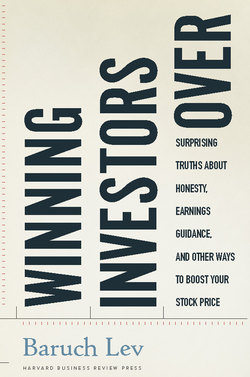Читать книгу Winning Investors Over - Baruch Lev - Страница 8
На сайте Литреса книга снята с продажи.
Chapter 1 It’s Not the End of the World What to Do—and Not Do—When Faced with Missing the Consensus Earnings Estimate
ОглавлениеIn This Chapter
Why a one-penny miss of the consensus is so deleterious.
What factors determine investors’ reaction to companies’ results.
Why high-growth companies that disappoint investors are hit hard.
What actions managers can take to avoid a consensus miss, and its consequences.
What course mitigates investors’ response to disappointments.
On June 26, 2007, the Kroger Company reported a 10 percent rise in first-quarter profits. The supermarket chain’s shares, however, fell 4.7 percent (the S&P 500 rose 0.6 percent).1 What gives? Kroger’s EPS, coming at $.47, missed the analysts’ consensus earnings estimate by a penny—the dreaded consensus miss.2 What happens to other companies that miss the consensus? Will their price drop further and linger on in a funk, or pick up with the improvement in business fundamentals? What types of companies are penalized harshly for missing the consensus and which remain largely unscathed? On the bright side, what happens when you “make the numbers”—meet or beat analysts’ estimates, or surpass last year’s EPS? And does it all matter beyond the few days surrounding the earnings release? The extensive evidence on these and related questions dealing with what is often dubbed “the earnings game”— managers’ continuous struggle to meet investors’ expectations—is highly revealing and will be analyzed next. At the chapter’s end, I advance a consequence-mitigation action plan for executives facing the specter of disappointing investors. In a nutshell, as indicated by this chapter’s title, missing the consensus, if dealt with appropriately, is not the end of the world. Far from it. In contrast, desperate attempts frequently taken to avoid disappointing investors by a last-minute sales blitz or cost cuts, an earnings boost from a change of accounting procedure, or—worst of all—manipulating the numbers are at best ineffective and often seriously counterproductive.
